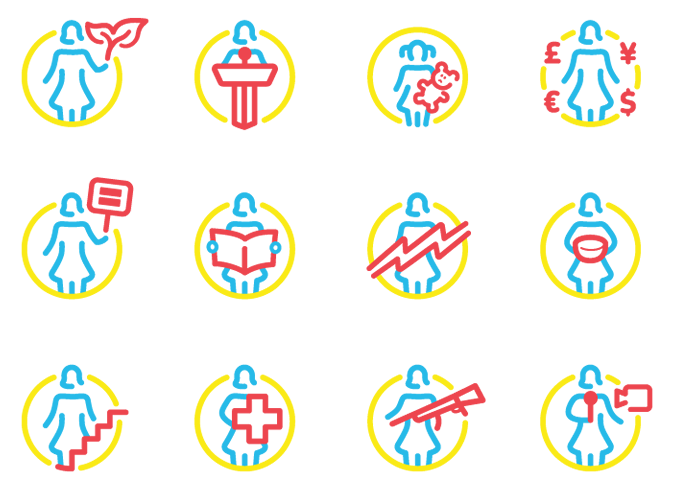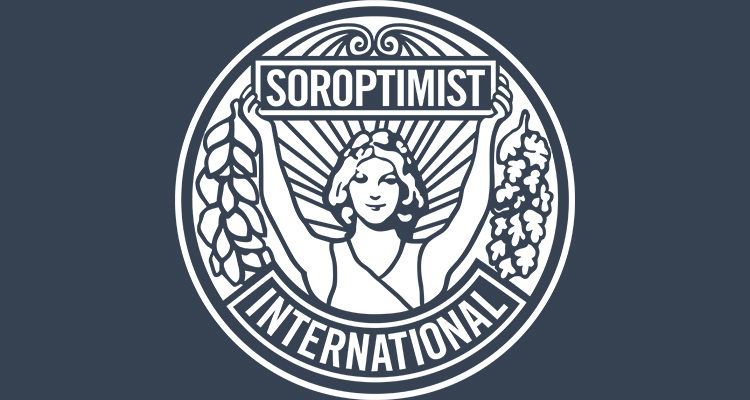As part of Soroptimist International’s (SI’s) series of blogs discussing the Beijing Declaration and Platform for Action (BPfA), SI UN Representative, Liliana Mosca, examines the topic of women and armed conflict, looking at both the legal framework that has developed in the years since the BPfA and the lived reality of women in the time of COVID-19.
“Armed conflict caused by government forces, pro-government militias, and rebel groups, directly and indirectly, affects women’s and girls’ rights. In times of conflict, women and girls are increasingly vulnerable to rape, forced marriage, forced impregnation, forced abortion, torture, trafficking, sexual slavery, and sexually transmitted diseases (STDs), including the Human Immunodeficiency Virus (HIV). Women and girls are also victims of genocide and enslaved for labour. Armed conflict has indirect negative effects on agriculture, livelihoods, infrastructure, public health, and welfare provision, that harm the women socially and psychologically. The situation is exacerbated by limitations on women’s participation in peace processes and decision-making in the post-conflict phase. A growing body of international research demonstrates that the lasting impact of armed conflict on women and girls is engendered by their social fragility.
Research has also shed light on women’s participation in violence during wars; in particular ‘support’ roles, and also as equal participants in combat, bombings, and suicide missions. In some cases, however, women and girls are forcibly recruited, whilst others join to flee oppression and abuse at home, including forced marriages, etc. Nonetheless, women’s presence in armed conflict is relatively limited when compared with males.
International law guarantees women and men equal rights, however, women and girls face discrimination and inequalities in armed conflict. Governing states, international organisations such as the United Nations, and women’s organisations, have done much to raise awareness. Various agreements have afforded protection to women and girls in situations of armed conflict from gender-based violence (GBV), in particular sexual violence in armed conflict (SVAC). Click HERE to view the legal framework relating to Women and Conflict.
On the 11th Annual Report on “Conflict-Related Sexual Violence” of last July, the UN Secretary General António Guterres declared that despite “important progress on the policy and operational fronts, we face an increasingly complex global security environment in which sexual violence remains a cruel tactic of war, torture, terror and political repression, and a brutally effective tool of displacement and dehumanisation”.

Beijing Platform for Action: 12 critical areas of concern. Image Courtesy of UN Women. Click the image to visit UN Women 12 critical areas webpage.
September 2020 is the 25th anniversary of the Fourth United Nations World Conference on Women in Beijing, 75 years since the establishment of the United Nations, and the 20th anniversary of Resolution 1325 on Women, Peace, and Security (WPS). Yet the spread of COVID-19 is hampering the implementation of Resolution 1325 and the pandemic will bring long-term consequences for women. Covid-19 is eroding the gains made in violence against women and girls and in armed conflict. The pandemic will deepen gender inequalities and insecurity in African, Asian, Middle-Eastern and South-American conflict-affected countries.
In the fragile states, COVID-19 is engendering negative effects on the socio-economic conditions, such as the healthcare systems, with an impact on women’s and girls’ healthy life. For example, in war-torn countries women may be denied testing.
The UN Women Brief ‘COVID-19 and ending violence against women and girls’ (VAWG) highlighted that VAWG will worsen “in a variety of contexts – in times of peace or conflict, or in the wake of conflict”. The Brief estimated that the global cost of the violence will be: “at approximately 2 percent of global gross domestic product (GDP), or US$1.5 trillion”. The UN Department of Economic and Social Affairs highlighted that Covid-19 will affect the Sustainable Development Goal (SDG)5: ‘Achieve gender equality and empower all women and girls’.
To reducing the socio-economic and humanitarian effects of COVID-19 on women and girls on armed conflict and on intrastate armed conflict, the UN Secretary-General last March asserted “the pandemic also poses a significant threat to the maintenance of international peace and security” and called for ceasefires to aid responses to COVID-19. Some armed groups in Afghanistan, Cameroon, Colombia, Myanmar, the Philippines, Thailand, Ukraine, and Yemen welcomed the UN Secretary-General’s appeal.
A month later the UN Secretary-General, launching the report ‘The Impact of COVID-19 on Women’, which urges governments “to put women and girls at the centre of efforts to recover from COVID-19″. The Policy Brief highlighted that the effects of COVID-19 “are further amplified in contexts of fragility, conflict, and emergencies where social cohesion is already undermined, and institutional capacity and services are limited”. The document asserts that women and girls should have access to COVID-19 public health messages in conflict-affected contexts.
The UN Secretary-General last June 19 referring to conflict-affected countries stated that Covid-19 may worsen the violence against women. In his message for the International Day for the Elimination of Sexual Violence in Conflict, Guterres called the International Community to stand in solidarity with survivors, to listen to them, to act on their experiences and decisions, to prevent and end these crimes, to place survivors at the centre of the response, to hold perpetrators accountable and expand support for all those affected.
The risk of gender-based violence in all conflict-affected countries is at an all-time high. The pandemic could further exacerbate women’s vulnerability in particular in areas where there are protracted conflicts. The specific issue of violence in armed conflict poses numerous challenges. These challenges require serious analyses for developing a truly effective and systematic action like that entered in the Beijing Declaration: “Increase the participation of women in conflict resolution at decision-making levels and protect women living in situations of armed and other conflicts or under foreign occupation”. What is needed is the political will and commitment of policymakers to prioritise the protection of women and girls and ensure these commitments become a concrete reality.”

